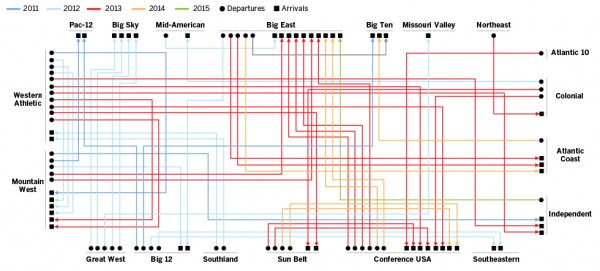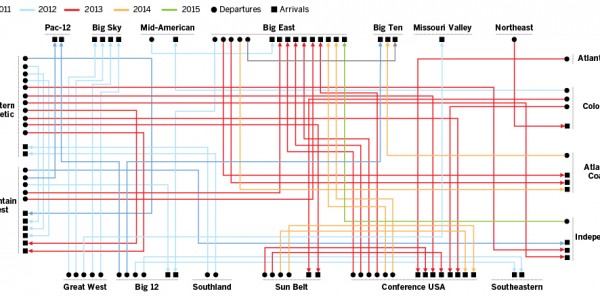
The most recent set of talks among NCAA administrators seems to be another step for the Big 12, ACC, Big Ten, Pac-12 and SEC to separate themselves from the rest of the competition by trying to give themselves more political power, and eventually another financial and competitive advantage.
While the talks held last week in San Diego were about all sports and athletics, football and basketball as well take center stage. Realignmnet wasn’t really on the table, but there’s an undercurrent that can’t be ignored. For now, no major changes are happening – the changes we saw in the last three or four years are slowing down. There won’t be anything like Texas A&M leaving or Nebraska changing conferences in the near future, but a lot depends on new rules being made.
The Power conferences, or Super conferences as some refer to them, are trying to get their own unique voice in the NCAA voting process. They want an autonomous voting body, and nearly 60% of NCAA administrators were in favor of that change.
The first thing the power conferences want to adopt? The pay-for-play for student athletes in some form. Increased compensation via a full-cost-of-attendance stipend, due to the gap that can range from hundreds to thousands of dollars between what their scholarship covers and the actual cost of attending college. The five have been trying for the last couple of years to pass legislation that increases athlete compensation, but have been outvoted by schools with less revenue to share.
Northeastern athletic director Peter Roby: I worry that the gap is going to get so large that the notion of competitive opportunity might not be possible for the rest of us. I don’t think we’re under the illusion that a Northeastern, or anyone in the mid-major category, is going to win basketball national championships. But those differences in revenue should be obstacles that prevent us, if we get in the tournament, from being able to win some games and advance. I just hope there are some concessions, and maybe some of us have the opportunity to compete a little more fairly.
NCAA president Mark Emmert seems to be on the big boy’s side: I think a lot of members are very worried about that. And that worry is certainly understandable. There already are some enormous economic gaps and competitive advantages. But the members that have more resources want to use them for the betterment of student-athletes.
So what does this have to do with realignment. College sports, basketball and especially football, are being reshaped. The end result? It’s moving more and more towards a direction of no more mid-majors or what used to be non-AQ conferences in College Football, where the big money really is. The big conferences want more money and more talent on their sides, and have no problem casting aside teams from the MWC, WAC and other conferences if they feel they’ve got nothing to add to them.
This will cause, once a few rule pass in favor of the Super conferences wishes, some more major shifting in team affiliation. The end result? A College Football league with five major conferences, while the rest get relegated or thrown out of the big leagues to fend for a lot less money, and struggle to attract even mediocre talent.
Graphic via LA times
